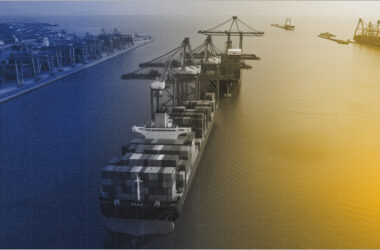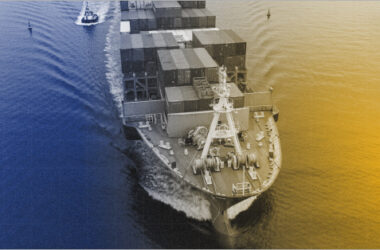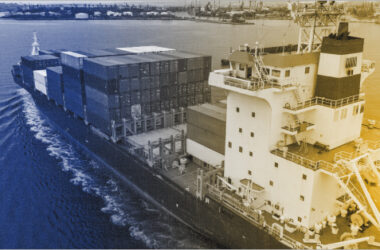Imagine your prized cargo, meticulously prepared for shipment across the vast Indian seas (or via land or air), facing unforeseen perils – a raging storm, a collision or a sudden capsizing.
Well, these risks are not merely hypothetical; they are real threats that can cause significant financial loss or damage to your business. This blog will explore the critical role of Marine Insurance in mitigating these risks and beyond. We will look into the benefits of this essential coverage and discuss the different types of Marine Insurance available in India. We will also guide you towards making informed decisions to protect your valuable cargo so that you can ensure the smooth flow of your business operations.
Stay tuned!!
Marine Insurance: A Bird’s Eye View
Marine Insurance serves as a financial safety net, protecting businesses from potential loss or damage during the transit of goods. It is a contract where the insurer agrees to indemnify the insured against loss or damage to cargo, ships or related liabilities during transit by sea, air, rail or road. This insurance policy covers the transportation of goods, vessels and associated risks.
Whether your business involves importing, exporting or even domestic shipping, investing in this insurance policy is a smart and essential decision. The marine insurance policy coverage acts as a buffer against financial risks, ensuring that your business remains resilient despite potential setbacks.
Different Types of Marine Insurance Policies
Understanding the different types of Marine Insurance is essential for selecting the right coverage. Here are the main types available in India:
1. Marine Open Insurance
- Covers goods during transit by sea, air, rail, or road.
- Offers continuous coverage for all shipments under one policy
- Protects the cargo against risks like theft, damage and loss throughout the transit journey
- Simplifies the process and saves time by ensuring seamless protection for all shipments under a single policy
2. Single Transit Insurance
- Covers a specific shipment or consignment during a single journey
- Offers financial protection against risks such as damage, loss or theft of goods during the journey from the starting point to the final destination
- Ideal for shipping companies and vessel owners who ship goods occasionally and do not need continuous coverage.
3. Sales Turnover Policy
- Here, businesses insure their estimated annual sales turnover, which becomes the sum insured.
- Ensures coverage for all transits needed to achieve this estimated turnover
- Premiums are calculated based on the total sales turnover, offering cost-effective coverage for all transits
In addition to the primary types of Marine Insurance policies discussed above, some other types are also available to cater to distinct coverage needs. Some of these are-
- Marine Cargo Insurance
Marine cargo insurance typically covers damage or loss due to external factors like collisions, natural disasters, theft, jettison (throwing cargo overboard) and more. It provides essential protection for goods in transit by sea, air, or land, whether you are importing or exporting. This insurance is ideal for businesses frequently shipping goods both domestically and internationally.
- Hull Insurance
Designed for shipowners, Hull Insurance covers physical damage to vessels, including incidents such as collisions, piracy, theft and accidents. It ensures that vessels remain operational despite damage caused by various perils at sea. This type of policy is especially crucial for businesses owning or operating fleets of vessels.
- Freight Insurance
Freight insurance secures shipping costs against risks like non-payment due to cargo loss, damage or delays that disrupt the delivery schedule. This policy ensures that businesses do not incur financial losses from undelivered or delayed shipments.
- Liability Insurance
Liability Insurance protects businesses from third-party claims for damages caused by shipping operations, including injury to workers, environmental damage, or pollution. This policy provides both legal and financial coverage in case of disputes or accidents during the shipping process.
Each policy is tailored to specific needs, allowing businesses to choose the most appropriate insurance policy coverage for their operations.
Key Benefits of Marine Insurance for Businesses
Here are several reasons why investing in Marine Insurance is a smart decision for your business:
1. Protects Against Financial Losses
Transporting goods, whether domestically or internationally, involves numerous risks, such as natural disasters, theft, accidents and piracy. India’s geographical location makes it vulnerable to monsoons, cyclones and heavy rainfall, increasing the likelihood of cargo damage. Marine cargo insurance ensures your business does not bear the full brunt of these losses, covering repair or replacement costs and safeguarding your financial stability.
2. Ensures Business Continuity
Unforeseen disruptions during transit can lead to financial setbacks, delayed operations and customer dissatisfaction. Marine Insurance minimises these disruptions by compensating for the loss or damage quickly, enabling you to fulfill orders and maintain client relationships. This resilience is particularly crucial for small and medium enterprises (SMEs), which often lack the resources to absorb significant losses.
3. Mitigates Risks in International Trade
For businesses involved in imports and exports, international trade routes come with added complexities, such as piracy in high-risk waters or geopolitical tensions. India’s growing trade ties with global markets mean that businesses must protect their shipments from these uncertainties. Marine cargo insurance provides the necessary security to navigate these challenges confidently.
4. Builds Credibility and Trust
Having Marine Insurance signals to your trading partners, suppliers and clients that you are a reliable and responsible business. It reassures them that their goods or investments are protected against transit-related risks. This credibility can enhance your business reputation, attract more clients and foster long-term partnerships.
5. Ensures Compliance with Regulations
Certain trade agreements, shipping contracts and regulatory requirements may mandate Marine Insurance. For example, exporters or importers must often provide proof of insurance to comply with international trade laws. Marine Insurance not only ensures legal compliance but also streamlines documentation processes, making transactions smoother and more efficient.
Moreover, Marine Insurance ensures compliance with the Marine Insurance Act, 1963, which governs contracts in India. This Act outlines the legal framework for insurable interests, upholds the principle of utmost good faith, and specifies warranties and terms to be followed by both insurers and businesses.
6. Tailored Solutions for Diverse Needs
Marine insurance policies are highly customisable, allowing businesses to choose coverage that aligns with their specific operations. Whether you are shipping high-value items, hazardous materials or perishable goods, insurers offer specialised plans to address unique risks. This flexibility ensures that you are not paying for coverage you don’t need while still addressing critical vulnerabilities.
7. Covers a Wide Range of Risks
A Marine Insurance policy can offer extensive coverage, protecting against risks such as:
- Loss or Damage to Cargo: Due to weather, accidents or theft.
- Legal Liabilities: For damages caused by shipping operations, including environmental harm or injury to third parties.
- Freight Non-Payment: If cargo is lost and freight charges remain unpaid, this coverage ensures that businesses are protected from financial loss due to undelivered goods.
This comprehensive protection ensures peace of mind and enables businesses to focus on growth rather than potential setbacks.
8. Caters to Both Domestic and International Shipping
Marine Insurance is crucial for international trade, providing protection for goods in transit via sea, air, or land. While it applies mainly to international shipments, certain policies can also be tailored for domestic shipping, particularly when goods are transported by sea or air.
9. Reduces Operational Risks
By covering potential losses, marine cargo insurance reduces operational risks, allowing businesses to allocate resources more effectively. Without insurance, even a single incident of cargo loss or damage could have a cascading effect on cash flow, inventory and reputation.
10. Encourages Risk-Taking in New Markets
Entering new markets, especially international ones, involves uncertainties regarding transit routes, regulatory environments, and potential risks. Marine Insurance empowers businesses to take these calculated risks, knowing that their shipments are protected.
Factors to Consider When Choosing Marine Insurance
- Coverage Options
Ensure the policy offers comprehensive coverage, including protection against natural disasters, theft, and accidental damage. Businesses must also evaluate additional coverages like war risks or strikes, which may be crucial depending on trade routes.
- Premium Costs
Balance affordability with adequate coverage. Compare premiums across providers to find the best value for your business. Keep in mind that lower premiums may result in limited coverage, so it’s essential to assess your specific needs.
- Insurer Credibility
Choose an insurance provider with a strong track record and financial stability. Look for insurers with high claim settlement ratios and positive customer reviews. A reputable provider ensures a smoother claims process and dependable support during times of need.
- Customisation Options
Opt for policies that can be tailored to your specific needs. For instance, businesses dealing with time-sensitive goods can include coverage for delays, while others may require extended coverage for high-risk zones.
- Claims Process
Understand the claims process of the insurer. A straightforward and efficient claims process can make a significant difference when dealing with losses. Consider insurers that offer digital claim filing and quick resolutions.
The Bottomline:
Marine Insurance is not just an optional expense; it’s a critical investment for businesses involved in goods transportation. With protection against financial loss, legal compliance and enhanced business credibility, the benefits far outweigh the costs. For Indian businesses, particularly those engaged in international trade, Marine Insurance is indispensable. By securing marine insurance, you are safeguarding not only your physical cargo but also the future of your business. As India continues to grow as a global trade hub, the need for robust risk management strategies becomes ever more crucial. Don’t wait for an unforeseen event to damage your business—protect your assets with the right Marine Insurance coverage.








